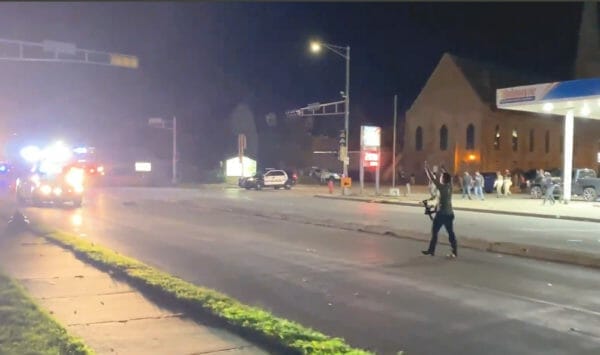
U.S.A. –-(AmmoLand.com)- As the defense rested in the murder trial of Kyle Rittenhouse—the teenager who shot three people last year during a riot in Kenosha, Wisconsin, killing two and wounding the third—a question that hasn’t been asked by any pundit is whether it was just the defendant on trial, or was the real target of this trial the act of self-defense?
Rittenhouse was 17 at the time when he fatally shot Anthony Huber and Joseph Rosenbaum and wounded Gaige Grosskreutz. Two of the shootings occurred within seconds of one another and were caught on video.
Wisconsin’s use-of-force/self-defense statute says:
- “A person is privileged to threaten or intentionally use force against another for the purpose of preventing or terminating what the person reasonably believes to be an unlawful interference with his or her person by such other person. The actor may intentionally use only such force or threat thereof as the actor reasonably believes is necessary to prevent or terminate the interference. The actor may not intentionally use force which is intended or likely to cause death or great bodily harm unless the actor reasonably believes that such force is necessary to prevent imminent death or great bodily harm to himself or herself…”
- “A person who engages in unlawful conduct of a type likely to provoke others to attack him or her and thereby does provoke an attack is not entitled to claim the privilege of self-defense against such attack, except when the attack which ensues is of a type causing the person engaging in the unlawful conduct to reasonably believe that he or she is in imminent danger of death or great bodily harm. In such a case, the person engaging in the unlawful conduct is privileged to act in self-defense, but the person is not privileged to resort to the use of force intended or likely to cause death to the person’s assailant unless the person reasonably believes he or she has exhausted every other reasonable means to escape from or otherwise avoid death or great bodily harm at the hands of his or her assailant.”
Self-defense statutes vary from state to state. What happened in Kenosha has been debated and will continue to consume considerable amounts of time and research.
Writing at the New York Post, veteran scribe Miranda Divine declares the shootings were “a clear case of self-defense.”
“He should never have been charged with murder,” Devine posits. “He was defending his life. The people who should be on trial are the cowardly adults in charge of Kenosha who allowed the town to descend into anarchy on three shocking nights in which rioters conducted the familiar campaign of violence and arson that marked the period leading up to the presidential election.”
On the other hand, writing at CNN, author and university professor Peniel E. Joseph says, “Kyle Rittenhouse, the 18-year-old on trial in Kenosha, Wisconsin, for shooting three people and killing two of them, represents the epitome of White privilege in America run amok.” He dubs Rittenhouse a “baby-faced vigilante.”
Much has been said about the men who were shot. What must be kept in perspective is that Rittenhouse didn’t know any of this at the time he shot them. Any criminal backgrounds revealed about any of the three men should not be part of the consideration. Only what occurred in the immediate prelude, leading Rittenhouse to conclude his life was in danger, should count, and that would include threats by one of the decedents to kill the teen.
As to the shooting of Huber, he had just struck Rittenhouse with a skateboard. Like it or not, a skateboard could be a lethal weapon when used to deliver a blow to the head or neck. Immediately after delivering the blow, Huber tried to grab Rittenhouse’s rifle, and that could easily be perceived as an attempt to seize the gun and use it against him. It is how Rittenhouse perceived it, and he said so.
Grosskreutz was shot as he aimed a pistol at Rittenhouse’s head. The video shows that and Grosskreutz testified to that on the witness stand, under oath. The teen didn’t fire until the pistol was aimed at him, or at least in his direction. Prosecutor Thomas Binger grilled Rittenhouse about why he was armed that night. The same question might be asked of Grosskreutz.
In an opinion piece at Fox News, media critic Howard Kurtz observed, “Rittenhouse, now 18, is no Boy Scout. Heading to a potential riot with a large gun and defying a curfew was a dumb move, notwithstanding his protests that he was looking to provide medical assistance and protect property…But his defense, once his lawyers chose to put him on the stance, was self-defense. And his claims were plausible enough to muddy the deliberations and perhaps produce an acquittal or hung jury.”
But Kurtz’s main beef is how the media has demonized Rittenhouse to the point of convicting him of murder without the benefit of a jury verdict, and he provided ample evidence to support that perspective.
“MSNBC contributor Jason Johnson branded Rittenhouse ‘the enemy’.” Kurtz writes. “An MSNBC analyst, John Heilemann, called him ‘arguably a domestic terrorist.’ An ABC News article called him an ‘alleged white supremacist.’ On Twitter, a Daily Beast writer lumped Rittenhouse in with ‘armed militias, White power groups, Proud Boys, Boogaloo extremists,’ while calling him a ‘murderer.’”
Separate the lack of wisdom on Rittenhouse’s part for even being in the middle of a riot in the first place, from the awful moments of confrontation with people he believed were intending to or physically trying to gravely injure or kill him.
Where would any other ordinary citizen be in the same situation, faced with the same set of circumstances, knowing what he or she knew at the time? This is where the Rittenhouse trial, and potential verdict, could have a direct impact on the act of lethal self-defense anywhere in the country.
The media has frequently raised hackles over self-defense related issues, especially the passage of shall-issue concealed carry statutes, and in more recent times, the adoption of so-called “Constitutional carry” laws.
If Rittenhouse is acquitted, it should reinforce the argument that armed private citizens have the right of self-defense even to the point of taking another life.
If he is found guilty, the concern will be how the rights of every other armed citizen could be subsequently jeopardized based on what would likely become known as “the Rittenhouse rule.”
RELATED:
About Dave Workman
Dave Workman is a senior editor at TheGunMag.com and Liberty Park Press, author of multiple books on the Right to Keep & Bear Arms, and formerly an NRA-certified firearms instructor.

